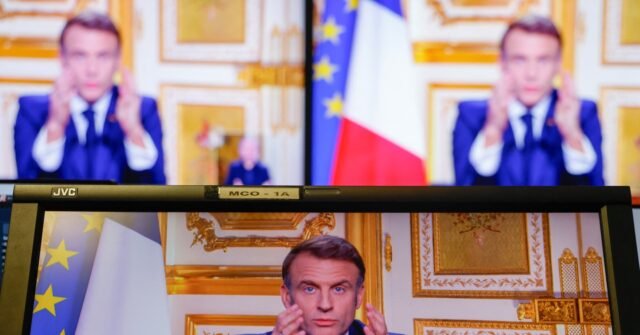In a national address following the historic collapse of his government, President Emmanuel Macron attempted to shirk responsibility for the political chaos in Paris and vowed to stay on until the end of his term despite growing calls for his resignation.
Speaking from the Élysée Palace on Thursday evening, President Macron declared that he will “never take responsibility” for the actions of others and that the true culprits of the instability facing France is an “anti-republican” alliance between the left-wing New Popular Front (NFP) coalition and Marine Le Pen’s populist National Rally (RN) after they joined together to censure the government of Michel Barnier over an attempt to pass effective cuts to social security payments to seniors without a vote in the National Assembly.
Macron chastised National Rally MPs for siding with the “extreme left” — ignoring that he sided with the far-left just months ago in the legislative elections — and said that “disorder is the only project which unites them with the extreme left, and this with the complicity of the rest of the New Popular Front.”
“The extreme right and the extreme left have united, in an anti-republican front, and because forces which until yesterday governed France have chosen to ally themselves. I would never take responsibility for others,” Macron said.
The president also attempted to deny responsibility for choosing former EU Brexit negotiator Michel Barnier as his prime minister following the snap legislative elections in July. Macron claimed that he only selected Barnier as a compromise candidate to ensure that the incoming prime minister would not be “censored upon his appointment”. In the end, Barnier lasted just 91 days in office, the shortest tenure for any prime minister in modern French history.
After trying to shift blame away from his office, the president sought to put a positive spin on the situation facing France — a country currently without a government and no budget for next year — comparing it to the Cathedral of Notre Dame, which will have its reopening ceremony held on Saturday in an event to be attended by incoming U.S. President Donald Trump.
“This project was thought to impossible but we did it,” he said. “Because there was a clear direction, a will. Everyone had an essential role for a cause above all of us. This is the same thing we need to do for the nation”. The president also said that he will seek pass a budget before the end of the year, however, it is unclear how he will manage to do so given the divisions in the National Assembly.
It is also unclear how Macron will attempt to rescue his own political future from the flames surrounding it. Contrary to early indications, he chose not to name a new prime minister on Thursday, perhaps suggesting that he has not found a worthy candidate willing to take up the job. However, the president repeated his vow to continue serving until the end of his term, saying: “The mandate that you democratically entrusted to me is a five-year mandate and I will exercise it fully until its end.”
Macron has largely been absent from frontline domestic politics in recent months, following his disastrous decision to call for snap legislative elections, in which his coalition received fewer votes than the both the leftist New Popular Front and Le Pen’s National Rally.
The result of July’s election left the country with an effective three-way split in the National Assembly. This was in large part a consequence of Macron’s doing, with the president having made a desperate last minute electoral alliance with the far-left as it appeared likely that Le Pen’s faction was on the precipice of victory.
The electoral chicanery succeeded in preventing his longterm rival from taking control of the parliament, but left the country in an apparently ungovernable position and with few options for remedy, with Macron being constitutionally barred from calling for fresh legislative elections until the middle of next year.
During the critical final days of the breakdown of his second government in the year, Macron was on the other side of the planet, having travelled to Riyadh for meetings with Saudi Arabian Crown Prince Mohammed bin Salman to discuss increased economic cooperation. The president returned to Paris on Wednesday afternoon just shortly before the vote of no confidence, however, by then, the die had already been cast, and Barnier fell just hours later.
While the president has vowed to remain in office until the end of his second and final term, which ends in 2027, there are growing pressures both domestically and internationally to make his exit from the political stage.
According to an Odoxa-Backbone Consulting survey for Le Figaro, six in ten voters (59 per cent) in France want to see the president resign from his post. Despite his attempts to shirk responsibility for the current instability in the country, nearly half of voters (46 per cent) hold Macron personally responsible, compared to 11 per cent for the National Rally and 10 per cent for the New Popular Front.
The calls to resign did not just come from at home, however, with newspapers across Europe calling for the French head of state to step down. In Italy, the Milan-based Corriere Della Sera declared upon the collapse of the Barnier government that “Macronism is dead,” adding: “The idea of clipping the wings and moving towards the center worked in two presidential elections, but collapsed in the face of the social crisis and the unpopularity of the president.”
Meanwhile, in neighboring Germany, where the government of Chancellor Olaf Scholz collapsed just a month ago, leaving power vacuums in the two major capitals of the EU, reviews were similarly negative. The Bavarian broadsheet the South German Zeitung branded Macron as “saboteur of the Republic.”
Going further, the Berliner Zeitung wrote: “Today, France is in ruins. The only way out of this deep political crisis is the departure of those responsible: Macron must resign and make way for something new!”
